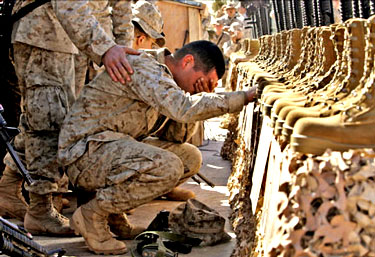 The U. S. Department of Defense is failing to provide adequate psychological support for troops serving in and returning from Iraq, according to a report by the American Psychological Association (APA). The 67-page report, which is authored by a task force of 8 psychologists, was released yesterday.
The U. S. Department of Defense is failing to provide adequate psychological support for troops serving in and returning from Iraq, according to a report by the American Psychological Association (APA). The 67-page report, which is authored by a task force of 8 psychologists, was released yesterday.
Here are the main findings:
- although more than 3 out of 10 soldiers met the criteria for a “mental disorder”, fewer than half of them received help. This was either because professional help wasn’t available to them, or because they failed to seek help due to the stigma associated with such conditions;
- there is no “well-coordinated or well-disseminated approach to providing behavioral health care to service members and their families”, and “relatively few high-quality” mental health programs in the U. S. military;
- 4 out of 10 army and navy positions for active duty licensed clinical psychologists remain unfilled; and
- only 10-20% of the miliary’s clinical psychologists are trained to deal with post-traumatic stress disorder (PTSD).
The inadequacies in mental health services for military personnel also have consequences for the troops’ families. (There are approximately 700,000 children in the U. S. with at least one parent deployed on military service.)
The report also provides a number of recommendations:
- a centralized leadership of military mental health to coordinate psychological services at military installations and in the community;
- more education about psychological services for the military leadership;
- a greater effort to recruit qualified military psychologists;
- unrestricted access to mental health care for troops;
- military mental health policy should take into account, and be responsive to, the diversity of troops’ situations and backgrounds;
- well-developed research programs, looking at the mental health needs of military personnel, the psychological toll of combat and the first-hand experiences of psychologists deployed with active combat units; and
- access of family members to mental health services should be improved.
Update (27th February, 2007): Discover magazine has an article about the treatment of troops who incur traumaic brain injuries while serving in Iraq, and there’s a long piece in the Washington Post about a soldier who was injurred in the line of duty but whose consequent disability not being compensated for by the U. S. army. (Thanks Alvaro and Greg.)

Fascinating, depressing, and — sadly — not too surprising. There was an excellent story in the Sunday Washington Post Magazine yesterday (2/25) about the difficulties one returned vet is having trying to get the benefits he’s entitled to; his injuries are mix of physical & emotional. Thanks for posting this very important information.
Discover magazine has a deep article on TBI and the Iraq War: showing the amazing effors the military does on the ground to help patients survive, but then the inadequate rehab services once soldiers are back in the US.
More reason for recommendation number 1 above, covering psych and neuropsych.
Pingback: SharpBrains
I have enormous feelings for the returning Vets. I would like not only WRAMC but even the VAMCs of the nation to be adequately funded to help the persons attending them rather than the buildings and their surroundings (That’s not to imply rats and roaches running around)
Pingback: CatCubed
Pingback: Neurophilosophy
Of course, the Department of Justice has the solution…throw them in prison! DOJ says veterans get longer sentences just for being veterans. Also, Vietnam era vets go to prison much more often than their non-veteran friends. It’ll be interesting to see how many OIF vets end up with mental health issues compounded by prison.
I am married to a 100 % service connected combat vet who suffers from severe PTSD. I have tried to locate a counselor to help me as his spouse learn how to respond in a loving and compassionate way but not enable or escalate the behavior. I have been completley unsuccesful in my attempts to get some guidance through the VA, they just refer me back to my local phone book for msw etc.. and there does not seem to be a network of professionals that have experience with combat PTSD and the family. It can be very frustrating and heartwrenching to stand by and watch your loved one go through this and feel completly helpless and uninformed. The VA could do a lot more to reach out to families of vets, those who are still in service and those living with the old wounds that may never heal.